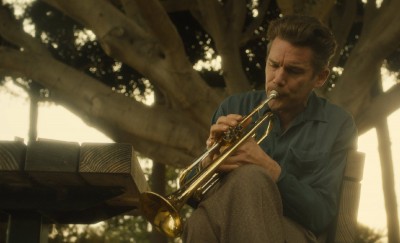
Biopics tend to follow the same basic formula — a sequence featuring the main character’s childhood, their rise to fame and then his or her subsequent downfall or death. “Born to Be Blue” breaks that mold, starting in the middle of famed and troubled trumpet player Chet Baker’s (Ethan Hawke) story.
In fact, the story includes events that didn’t happen and characters that don’t even exist. The changes that are made to Baker’s story are subtle, and put the focus on Baker’s character rather than his timeline.
This strategy is incredibly effective, and the film manages to capture Baker’s soul. Baker, who won fame in the ’50s as the father of the West Coast jazz scene, became addicted to heroin and lost much of his fan base in the ’60s. He made a successful comeback in the ‘70s and ‘80s before dying at age 59.
Director Robert Budreau explored Baker’s life in film before with his 2009 short film, “The Deaths of Chet Baker.” While “Born to Be Blue” highlights Baker’s life in the ‘60s, the short film examines Baker’s 1988 death in Amsterdam.
“Born to Be Blue” begins with Baker’s incarceration in Italy on drug charges. He is released only after a director arrives, wanting to shoot a film about his life. This film never existed, but Baker had acted in several films early in his career, making this change believable.
The idea of a biopic within a biopic creates interesting opportunities to explore Baker’s past without actually changing the time period of the film. Instead of seeing flashbacks, the audience is watching “scenes” from the film being shot within the movie.
Baker’s biopic is derailed, however, after the famously true incident in which a former dealer knocks out Baker’s teeth. The plot then focuses on Baker’s struggle to rehabilitate, with particularly gut-wrenching scenes in which he tries to learn to play the trumpet again, despite his injuries and new set of false teeth.
These sequences are rather reminiscent of the intense practice scenes from last year’s Oscar-nominated film “Whiplash,” about a tortured jazz drummer. While jarring, Baker’s bloody recuperation is powerful, and sets the tone to a sense of struggle that carries through the film.
The relationship between Baker and jazz trumpet legends Miles Davis (Kedar Brown) and Dizzy Gillespie (Kevin Hanchard) is a major component of the film. Baker is desperate to impress the two icons who don’t seem very interested by him. Charlie Parker, famed saxophonist and fellow heroin addict, reportedly told Davis and Gillespie about Baker, “You better look out, there’s a little white cat on the coast who’s gonna eat you up.”
This line is repeated throughout the film, both by Baker and in scenes from New York performances. His inability to win over Davis tortures him and impacts many of his decisions throughout the film.
Hawke’s performance as Baker is nearly flawless. He masters the subtle physical and musical nuances that characterize Baker. From his gap-toothed smile to his suave stage presence, Hawke resurrects Baker on the screen. He also captures Baker’s thin, strained style of singing that developed later in his career remarkably well.
The film’s other lead, Jane (Carmen Ejogo), is a fictional character who represents the women in Baker’s life. This is reflected in the fact that she also plays the part of Baker’s fictional wife Elaine in the movie shot within the film. Ejogo fights throughout the film to keep Baker on the straight and narrow, while simultaneously pursuing her own independent acting career.
Ejogo skillfully plays both Baker’s muse and champion, sharing the burden of his addiction and the battle to become great again. The chemistry between them is surprisingly intense despite Hawke’s intentionally gaunt and sickly appearance.
Callum Keith Rennie, who plays the owner of a recording studio and Baker’s longtime friend, does an admirable job portraying the conflicting nature of his relationship with Baker. Rennie’s character Dick wants to help Baker, but he is tired of his addiction and unreliability. His emotional struggle between choosing friendship over business is another recurring theme of the film.
Baker’s father (Stephen McHattie) is impeccably cast. McHattie, cast as Baker in Budreau’s “The Deaths of Chet Baker,” is the spitting image of an ailing and aged version of the musician.
Although the dialogue has heavy-handed and overly dramatic moments, the writing sets the right tone and mood. The film’s cinematography is truly captivating. Long, sweeping shots of the California coast and Oklahoma farmland featuring Baker wandering aimlessly while practicing create a pervading sense of loneliness and melancholy.
“Born to Be Blue” is brilliant, with stellar performances and a fascinating perspective on one of the 21st century’s greatest jazz musicians. While biopics with tragic leads can often feel tired and overdone, “Born to Be Blue” breathes new life into the genre.





















































































































eleanor gilbert • Apr 13, 2016 at 1:12 am
‘Just saw the movie- “Born to be Blue” and loved it. I would recommend it highly. I have become an admirer of Chet Baker after I first heard his song “I fall in love to easily” several years ago.